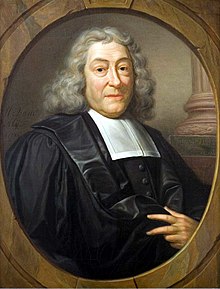Franciscus Fabricius
Franciscus Fabricius , also: Franz Fabritius ; (Born April 10, 1663 in Amsterdam ; † July 27, 1738 in Leiden ) was a Dutch Reformed theologian.
Life
Franciscus Fabricius was a son of the pastor Johannes Fabricius, who died in Nieuwkerk, and his wife Katharina Felbier. He lost his parents when he was five years old. His maternal grandfather Johannes Felbier then took care of the boy's upbringing and sent him to the Athenaeum Illustre Amsterdam , where he should acquire a level of education that would enable him to take up a theological profession. Here he learned the basics of the oriental languages and acquired a basic framework in theological sciences. In 1681 he moved to the University of Leiden , where he attended the lectures of the most important scientists in this field. In 1687 he became pastor in Velzen and in 1696 in Leiden.
There he gained such respect that the curators of the Leiden University appointed him professor of theology on November 8, 1705 as successor to Jacobus Trigland the Younger . After he had received an honorary doctorate in theology from the Senate of the Leiden University on December 11, 1705, he took up the chair with the introductory speech De Christo unico ac perpetuo Ecclesiae fundamento (Leiden 1717) on December 15, 1705 . He established himself as a theologian in the direction of Johannes Coccejus and participated above all in the training of theologians in the field of homiletics .
This earned him a chair for theological rhetoric on November 8, 1721, which task he took over on June 17, 1722 with the speech De oratore sacro . He also took part in the organizational tasks of the university three times and was rector of the Alma Mater in 1716/17, 1724/25 and 1736/37 . He resigned these offices in 1717 with the speech De scholis prophetarum , in 1725 with the speech De scriba, docto in regno coelorum and in 1737 with the speech De provida christiani praesertim theologi senectute . Due to his old age, he was dismissed from his professorship on July 12, 1734. The British Royal Society for the Propagation of the Gospel accepted him as a member in 1726.
His son Johannes Fabricius, who died at the age of 24, came from his marriage to Anna van Teylingen on February 20, 1690.
Works
- De Christo unico ac perpetuo ecclesiae fundamento. 1705, 1717
- De impositione nominis Evae. 1711
- De impositione nominis Noachi. 1712
- De impositione nominis Sethi. 1712
- Redevoering over eens Christens voorzigtigen ouderdom. Leiden, undated
- Redevoering over deschriftgeleerden, onderwezen in het koningrijk der Hemelen. Leiden 1717
- De oratore sacro. Leiden 1722, 1733, 1735
- Holy Speeches. Leiden, undated
- De sacerdotio Christi juxta ordinem Melchizedeci. 1720, in Dutch: Leiden 1740
- Belijdenis Predicatie, of Christen Godgeleerdheid, ontworpen uijt de woorden van den Heere Jezus Christ. Suffering 1723
- Oratio in natalem centesimum et quinquagesimum Academiae Batavae, quae est Lugduni Batavorum. Leiden, 1725; translated into Dutch by Dirk Smout: Leiden 1725
- Christologica Noachica et Abrahamica. Leiden 1727
- Voorbeeld of the gezonde woorden. Suffering 1729
- Empty speech op de vernieuwde kerk te Hoogmade. Leiden 1730 ( online )
- De Fide Christiana Patriarcharum et Prophetarum. Leiden 1730
- Empty speeches over Num. XX vs. 25-28, ter investiging van Ds. J. van den Honert. Leiden 1734
- Predicatiën en Leerredenen. Leiden and Utrecht, 1735 (with J. van den Honert)
- Theologia Christiana ex solis Christi verbis. Leiden 1735
- Empty speeches over 2 Chron. V. vs. 11-14, the opening of the Zuid-Hollandsche Synod te Gorinchem. Gorinchem 1736
- Kerkelijke Redevoering van Fr. Fabricius over Psalm XXXIV: 12-19, openlijk uitgesproken den24 November des jaars 1737, toen hij zijne jubilé-predikatie deed over zijnen vijftigjarigen ministry in de christen-Gemeente, first te Velzen, en vervolgens te Leiden. Leiden 1738
- Eight Academische en Kerklijke Redevoeringen. Leiden, undated
- Geschiedenis the Oude Israelite Church. Leiden 1740
- Opera omnia Philologica, Theologica, Exegetica et Oratoria. Leiden 1717, 1738, 1740
literature
- Christian Gottlieb Jöcher : General Scholar Lexicon, Darinne the scholars of all classes, both male and female, who lived from the beginning of the world to the present day, and made themselves known to the learned world, After their birth, life, remarkable stories, Withdrawals and writings from the most credible scribes are described in alphabetical order. Verlag Johann Friedrich Gleditsch, Leipzig, 1750, Vol. 2, p. 480
- Johannes van den Honert: Oratio de Vita et Obitu Clarissimi ac Plurimum Venerandi Viri, Francisci Fabricii, (...). Samuel Luchtmans, Leiden, 1738, ( Online , Latin)
- Aart de Groot: Biographical Lexicon voor de geschiedenis van het Nederlands Protestantisme. Uitgevers Maatschappij JH Kok, Kampen, 1988, ISBN 90-242-4461-7 ; Vol. 3, p. 109, ( online )
- Laurentius Knappert: FABRICIUS (Franciscus) (2) . In: Petrus Johannes Blok , Philipp Christiaan Molhuysen (Ed.): Nieuw Nederlandsch Biografisch Woordenboek . Part 3. N. Israel, Amsterdam 1974, Sp. 380–382 (Dutch, knaw.nl / dbnl.org - first edition: AW Sijthoff, Leiden 1914, reprinted unchanged).
- Abraham Jacob van der Aa : Biographical Woordenboek der Nederlanden. Verlag JJ van Brederode, Haarlem, 1859, vol. 6, p. 11, ( online )
- Barend Glasius: Biographical Woordenboek van Nederlandsche Godgeleerden. Muller Brothers, 's-Hertogenbosch 1851, Vol. 1, p. 454, ( Online , Dutch)
Web links
- Short CV (English)
| personal data | |
|---|---|
| SURNAME | Fabricius, Franciscus |
| ALTERNATIVE NAMES | Franz Fabritius |
| BRIEF DESCRIPTION | Dutch Reformed theologian |
| DATE OF BIRTH | April 10, 1663 |
| PLACE OF BIRTH | Amsterdam |
| DATE OF DEATH | July 27, 1738 |
| Place of death | Suffer |
